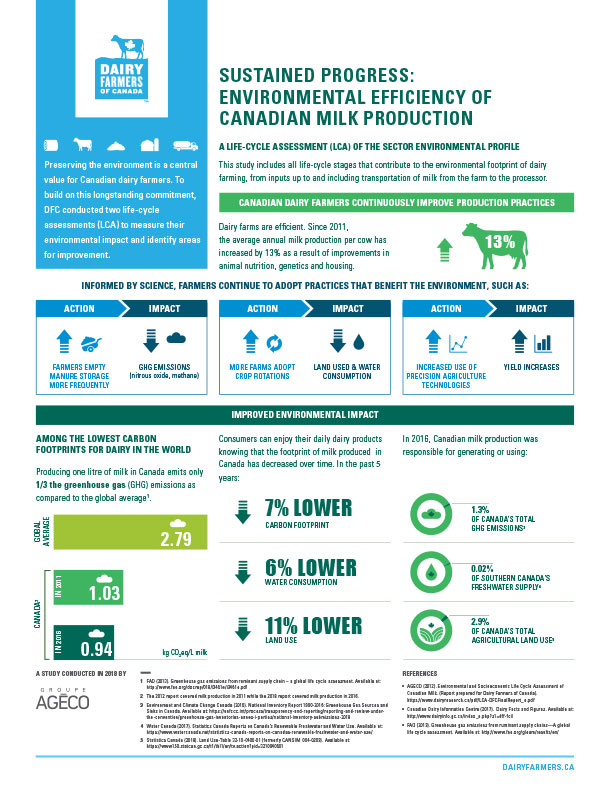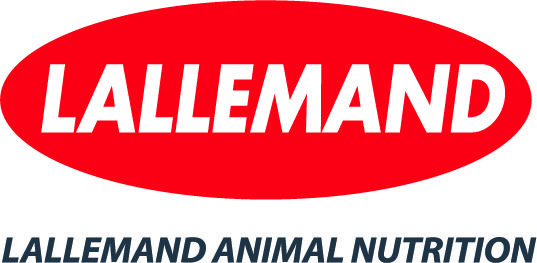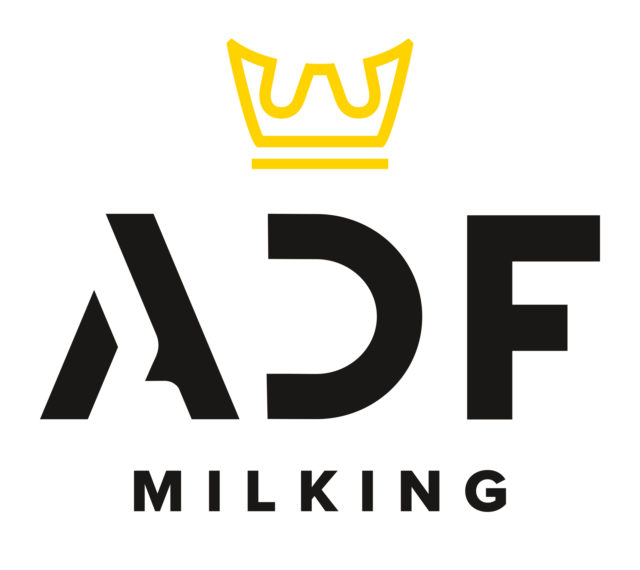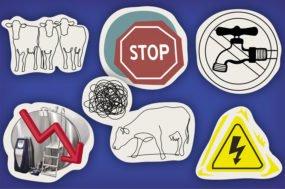The carbon footprint of a jug of milk has dropped over the last five years, and it’s expected to drop further. Land and water footprints have also dropped.
Those are the main conclusions of a recently released study of the environmental impact of milk production. Produced by Groupe AGECO for Dairy Farmers of Canada, it compares 2016 figures with an earlier assessment using figures for 2011.
Canadian dairy farmers have cut their greenhouse gas emissions from 1.03 down to 0.94 kilogram of carbon dioxide equivalent per litre of milk (7 percent).
Dairy cows, like all ruminants, can digest and use plants and parts of plants humans can’t – grass, whole corn or barley plants, for example. They digest these materials with the help of microbes in the rumen, or paunch and cud-chewing, but this process generates methane, which makes up much of the carbon footprint of milk.
Canada’s dairy farmers use a total of 2.9 percent of the country’s farmland and 0.02 percent of our freshwater supplies. The land needed for each litre of milk fell by 11 percent, and water use dropped 6 percent. Water is mostly used to irrigate crops for feed.
Groupe AGECO calculated life-cycle footprints that include every part of producing milk from all the materials used to build barns and equipment, fuel and electricity to run the operation and transport milk to the processing plant.
Not only growing feed and meeting all the cows’ needs but also those of replacements, or calves, are included.
More milk, less impact
Dairy farmers have reduced their environmental impact because milk production per cow has increased.
Click here or on the image above to view it at full size in a new window.
On average, each cow in Canada in 2016 produced 9,582 kilograms of milk a year, almost 13 percent more than the 8,492 kilograms each cow produced in 2011.
A cow needs a certain amount of feed to maintain its body and produce milk as well. Producing more milk takes a relatively small increase in feed – and manure, so the environmental footprint of each litre of milk is smaller.
The improvement in milk production per cow from 2011 to 2016 is mainly due to improved cow genetics, especially using the new technology of genomics, which has doubled the annual gain in dairy cow productivity.
Scientifically balanced nutrition and comfortable housing help high-performing cows stay healthy and milking well.
The importance of productivity to the environmental impact of farming is in line with estimates from around the world.
Livestock operations with high-quality feeds and high productivity have the smallest carbon footprints, despite their use of fossil fuels and fertilizers.
Producing more units of milk or meat from the same or slightly more resources reduces the impact of each meal.
More efficient crop production
Shrinking environmental impacts are not entirely due to more productive cows. As liquid manure ages in storage, it is affected by microbes and emits greenhouse gases.
Farmers are emptying their manure storages more often to reduce greenhouse gas emissions. This and manure incorporation soon after application adds more nutrients in soil.
Growing crops has become more efficient, with less tillage and crop rotations with different crops improving soil. It’s more mellow, with more organic matter, so moisture infiltration and retention improve, boosting crop yields.
Precision farming technologies, especially auto-steer, which positions any implement so it’s exactly beside the last pass, have been adopted very rapidly.
Every part of the field receives the exact amount of seed, fertilizer or herbicide needed for the best yields. With no double-spraying at the edges of the implement, there are no wasted resources.
Adding maps of growing conditions and electronic metering of fertilizer allows farmers to change the amounts of fertilizer or herbicide on different parts of the field and increase yields from the whole field. ![]()
Founded in 1934, Dairy Farmers of Canada (DFC) is the national organization which defends the interests of Canadian dairy farmers and strives to create favourable conditions for the Canadian dairy industry. Working in accordance with supply management principles, DFC promotes safe, high quality, sustainable and nutritious Canadian dairy products made from 100% Canadian milk through various marketing, nutrition, policy and lobbying initiatives. Driven by a strong sense of community and pride, DFC and Canadian dairy farmers actively support a number of local and national activities. Visit dairyfarmers.ca for more information.









